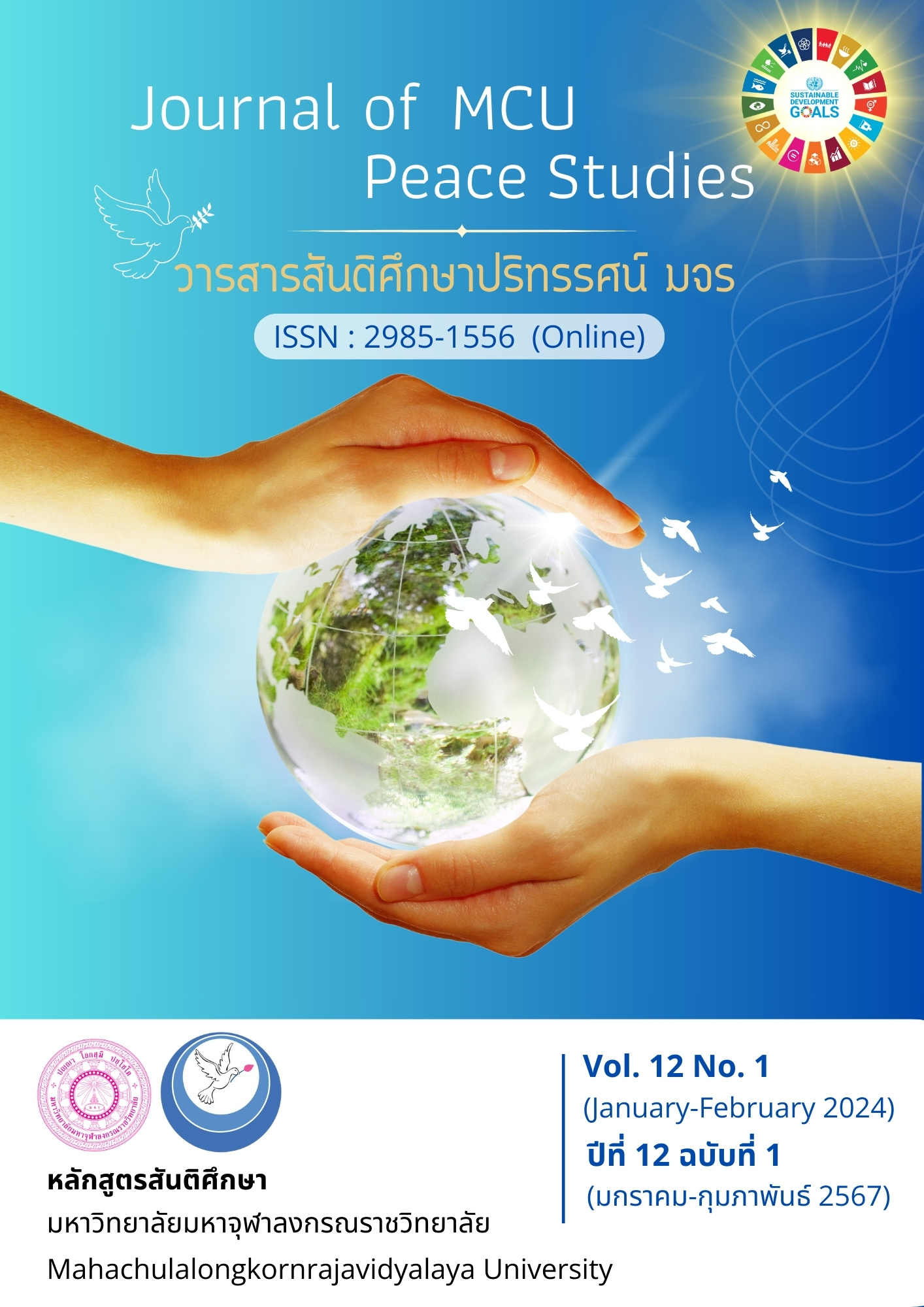กระบวนการพัฒนาพ่อแม่ เพื่อนที่ปรึกษาสำหรับวัยรุ่น เพื่อเสริมสร้างครอบครัวสันติสุขโดยพุทธสันติวิธี
Main Article Content
บทคัดย่อ
บทความวิจัยนี้มีวัตถุประสงค์ 1) เพื่อศึกษาสภาพปัญหา ความต้องการจำเป็น แนวคิดทฤษฎี และหลักพุทธสันติวิธีการพัฒนาพ่อแม่ให้เป็นเพื่อนที่ปรึกษา 2) เพื่อพัฒนากระบวนการพัฒนาพ่อแม่ให้เป็นเพื่อน ที่ปรึกษาสำหรับวัยรุ่นเพื่อเสริมสร้างครอบครัวสันติสุขโดยพุทธสันติวิธี ใช้วิธีการวิจัยแบบผสมผสาน ด้วยการทดลองนำร่อง ใช้การสัมภาษณ์เชิงลึก 11 คน สนทนากลุ่มเฉพาะผู้เชี่ยวชาญ 6 คน ทดลองกับกลุ่มพ่อและแม่ จำนวน 13 คน และวัดผลด้วยแบบประเมินสมรรถนะพ่อแม่ เพื่อนที่ปรึกษา การสังเกตการณ์ การสะท้อนคิด วิเคราะห์ด้วยค่าสถิติ t-test โดยมีระยะเวลาในการทดลองระหว่างเดือน กันยายน 2565 ถึงเดือนเมษายน 2566
ผลการวิจัยพบว่า
1) ปัญหาสาเหตุ และอุปสรรค ของพ่อแม่ที่ไม่สามารถเป็นเพื่อนที่ปรึกษาสำหรับลูกวัยรุ่น คือ การขาดความรู้ความเข้าใจในการให้คำปรึกษา ทักษะการสื่อสารเพื่อเข้าถึงความสัมพันธ์สำหรับลูกวัยรุ่นที่มีความเปราะบางด้านความคิด ภาวะอารมณ์ และจิตใจ พ่อแม่มีความจำเป็นต้องพัฒนาเป็นเพื่อนที่ปรึกษาสำหรับลูกวัยรุ่น ด้วยแนวคิดการสื่อสารอย่างสันติ การเป็นที่ปรึกษา และ จิตวิทยาวัยรุ่น หลักพุทธสันติวิธีที่เอื้อต่อพัฒนาทักษะของพ่อแม่ในการสื่อสารกับบุตรที่เป็นวัยรุ่น คือ สติ ไตรสิกขา และพรหมวิหารธรรม
2) กระบวนการพัฒนาพ่อแม่ เพื่อนที่ปรึกษาสำหรับวัยรุ่นเพื่อเสริมสร้างครอบครัวสันติสุขโดยพุทธสันติวิธี ด้วยหลักสูตรอบรมเชิงปฏิบัติการ 2 วัน และปฏิบัติการเปลี่ยนแปลงตนเอง 21 วัน ด้วยการเรียนรู้แบบกลุ่ม ประกอบด้วย 4 Module คือ 1) จุดพลังความคิดสู่ทัศนคติที่ถูกต้องของการเป็นพ่อแม่ 2) การสร้างความเข้าใจในบทบาทการเป็นพ่อแม่ 3) การจัดการอารมณ์เชิงบวกอย่างสร้างสรรค์ 4) การสื่อสารในการเป็นพ่อแม่ เพื่อนที่ปรึกษาวัยรุ่น พบว่า ค่าเฉลี่ยแบบวัดสมรรถนะพ่อแม่ เพื่อนที่ปรึกษา หลังการทดลองสูงกว่าก่อนการทดลองอย่างมีนัยสำคัญทางสถิติที่ระดับ .05 องค์ความรู้ที่ได้ “3A Model” หรือ “โมเดลพ่อแม่พลัง 3 เอ” กับสี่ทักษะ ในการพัฒนาเป็นพ่อแม่ เพื่อนที่ปรึกษาวัยรุ่น
Article Details

อนุญาตภายใต้เงื่อนไข Creative Commons Attribution-NonCommercial-NoDerivatives 4.0 International License.
ทัศนะและความคิดเห็นที่ปรากฏในบทความในวารสาร ถือเป็นความรับผิดชอบของผู้เขียนบทความนั้น และไม่ถือเป็นทัศนะและความรับผิดชอบของกองบรรณาธิการ ยินยอมว่าบทความเป็นลิขสิทธิ์ของวารสาร
เอกสารอ้างอิง
Arnold, J. (2009). Coaching Skills for Leaders in the Workplace. United Kingdom: How to Content.
Barkley, S. G., & Bainco, T. (2010). Quality Teaching in a Culture of Coaching. (2nd ed.). The United States of America: Rowman and Littlefeild Publishers, Inc.
Data Innovation and Governance Institute. (2022). How Many Couples Get Married and Divorced in Bangkok Each Year? Retrieved December 3, 2023, from https://digi.data.go.th/showcase/married-and-divorced/
Johnson, R. B., & Christensen, L. (2014). Educational Research Quantitative, Qualitative, and Mixed Approaches. (5th ed.). Thousand Oaks: Sage.
Laopoonphat, C. (2022). Former Deputy Dean for Administrative Affairs, Faculty of Psychology, Chulalongkorn University. Interview. December, 2.
Matichon Online. (2021). Future Thai Family. Retrieved June 15, 2022, from https://www.matichon.co.th/columnists/news_2770185
McClelland, D. C. (1995). Test for Competence, Rather than Intelligence. American Psychologists, 17(7), 57-83.
National Statistical Office, Ministry of Information and Communication Technology (2018). Executive Summary Survey of Social, Cultural and Mental Health Conditions 2018. Retrieved August 3, 2022, from https://goo.gl/BWB1RE
Office of the National Economic and Social Development Board, Office of the Prime Minister. (2017). National Economic and Social Development Plan Issue twelfth 2017-2021. Bangkok: Office of the National Economic and Social Development Board, Office of the Prime Minister.
Office of Women's Affairs and Family Institute. (2017). Curriculum/Manual for Family Camp. Retrieved June 13, 2022, from http://www.owf.go.th/wofa/modules/website/upload/article/97d69bd36c33cofb50a40ddd5889db20.pdf
Prasertsuk, N. (2015). Constructive Communication for Family Happiness. Veridian E-Journal, Slipakorn University, 8(2), 737-747.
Rosenberg, M. (2018). The Heart of Nonviolent Communication (NVC). Retrieved June 3, 2022, from https://www.Nonviolentcommunication.Com/FreeresourcesArticle_Archive/Heartofnvc_Mrosenberg.Htm
Sakulboonrasi, P., & Limwathanakul, P. (2023). Teenage Representative. Interview. January, 22.
Suthisukon, K., Chompikul, J., & Thamma-aphiphol, K. (2017). Factors Affecting Relationships in Thai Families. Local Administration Journal, 10(2), 151–168.
Tashakkori, A., & Teddlie, C. (2003). Handbook of Mixed Methods in Social & Behavioral Research. Thousand Oaks: Sage.
Thanee, T., Deenan, A., & Duangpaeng, S. (2011). Program Development to Promote Love in Adolescent Family. The Journal of Faculty of Nursing Burapha University, 19(Supplement 2), 29-41.
Valerio, A. M., & Lee, R. J. (2005). Executive Coaching: A Guide for the HR Professional. San Francisco: Pfeiffer.
Wongphudee, P. (2022). Advisor to the Extraordinary Committee. A Special Committee Considered and Studied Ways to Prevent and Solve Problems of Rape and Sexual Harassment. Interview. December, 20.


